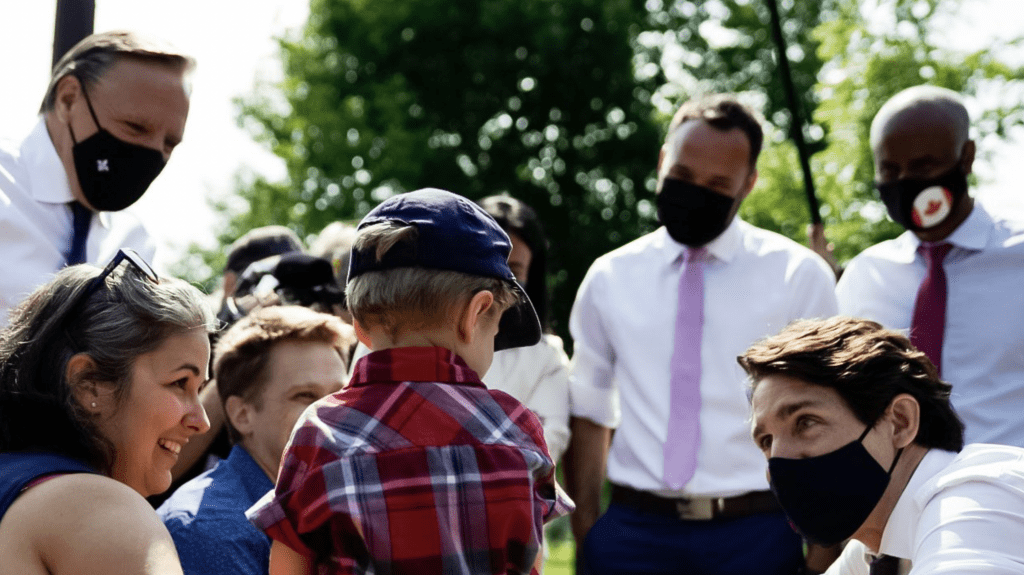Campaign 2021: The Political Narrative vs. the Pandemic Narrative

Justin Trudeau/Twitter
Lisa Van Dusen
August 12
It’s always nice to start your election coverage with a cliché; it reassures readers that you’re not some parvenue amateur unfamiliar with all the hoary political truisms that are readily available to them by clicking on other election punditry URLs.
It’s like saying hello to an old friend before embarking on an adventure that could be an enlightening debate of the issues crucial to Canadians at a time of unprecedented complexity or a perpetual pinball ricochet from asinine social-media bumper to viral bozo-eruption flipper and back again, for 36 days.
In that spirit: Campaigns matter.
In the case of the campaign launched by Prime Minister Justin Trudeau on Sunday for an election to be held on September 20, it matters more than it might have in some long-ago, more analog, less Malthusian era, when the meta-manipulation of covert political warfare, the dog-wagging role of polls and the tactical weaponization of Twitter were just far-off Jules Verne-y fantasies adorning the dreams of the most Machiavellian scoundrels.
This campaign will matter because, as the mechanism for a minority government asking Canadians to double down on the status quo by entrenching it with a majority, it will be conducted amid the very public health constraints necessitated by the pandemic whose management will be a key element of the government’s case. That story-within-a-story presents the possibility for myriad ironies involving the ass-biting potential of fourth-wave surges and/or nasty new variants. It is already being flagged as an inhibitor of Justin Trudeau’s crowd-bath-fueled retail politics advantage and as a possible deterrent to voting (that didn’t happen, btw, in the 2020 US election).
It will also matter because these days, every election campaign of any consequence, anywhere in the world, is a narrative — with a beginning, a middle and an end — and, as such, also a target-rich environment. Election campaigns have always been narratives, but in the days before 21st-century, internet-amplified narrative warfare, they were not as susceptible to the engineered, operational wankery that has elevated what was once known in the trade as dirty tricks or ratf***kery to industrial levels. This phenomenon has been most obvious, obviously, in the United States, with the UK a close second in the tactical political lunacy sweepstakes.
That story-within-a-story presents the possibility for myriad ironies involving the ass-biting potential of fourth-wave surges and/or nasty new variants. It is already being flagged as an inhibitor of Justin Trudeau’s crowd-bath-fueled retail politics advantage and as a possible deterrent to voting (that didn’t happen, btw, in the 2020 US election).
It will also matter because the prime minister’s discretion in calling the election amid the latest upward swing (especially relative to the free-at-last euphoria of the spring) in a roller-coaster pandemic makes the timing of the campaign a question whose value to the Conservatives, NDP, Bloc Québécois and Greens will depend entirely on epidemiological developments. An Abacus Data poll posted on Thursday shows that the vast majority of Canadians are not put off by the idea of an early election, with 83 percent saying they won’t be upset by the timing. The same poll reports that, if an election were held now, the Liberals would win 37 percent of the vote, the Conservatives 28 percent, the NDP 20 percent, the Green Party 5, with the BQ at 22 percent in Quebec. Which leaves the more practical question of how the pandemic narrative will impact the campaign narrative.
Meanwhile, beyond the tactical trajectory of a campaign sprocketed by the sort of commodified drama whose provincial iteration Dalhousie’s Lori Turnbull recently described in her Policy magazine piece, Nova Scotia’s Summer Campaign: Substance Eclipsed by Sideshows there are serious issues facing the country.
The immediate one is managing the ongoing health and economic crisis of a deadly global pandemic, or as the Liberal government will present it: stay the course. The larger one, per that other cliché that elections are about the future, is what kind of country do we want to live in post-pandemic?
On that front, Erin O’Toole’s leadership problems have, so far, obscured what he might have to say about how the current Conservative party envisions Canada’s economic future. NDP Leader Jagmeet Singh has embraced the legacy NDP plank of taxing the rich that has moved from the realm of boilerplate into pragmatism given the force-multiplying impact of the pandemic on economic inequality.
Meanwhile, the Trudeau government can point to Canada’s inoculation record, its fiscal micro-calibration of the intertwined health and economic outcomes of the pandemic, and the argument that that other campaign cliché, the “throw the bums out” rationale, has little credible traction in this case. It would take quite a narrative to change that in five weeks.
Lisa Van Dusen is associate editor of Policy Magazine. She was Washington columnist for the Ottawa Citizen and Sun Media, international writer for Peter Jennings at ABC News, and an editor at AP National in New York and UPI in Washington.
